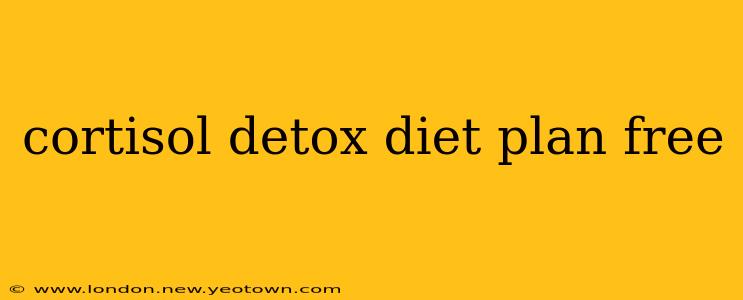Feeling stressed? Constantly tired? Gaining weight despite your best efforts? These could be signs of imbalanced cortisol levels. Cortisol, often called the "stress hormone," plays a crucial role in regulating your body's response to stress. But chronic stress leads to chronically high cortisol, throwing your system out of whack. While there's no magic "detox" in the literal sense, a carefully planned diet can significantly help manage cortisol levels and improve your overall well-being. This isn't a quick fix, but a journey towards a healthier, more balanced you. Let's embark on it together.
What is Cortisol and Why is it Important?
Before we delve into the diet, let's understand cortisol better. Imagine your body as a finely tuned orchestra. Cortisol is the conductor, ensuring everything functions harmoniously. It regulates your blood sugar, metabolism, blood pressure, and even your immune response. When you face a stressful situation, cortisol kicks in, providing the energy needed to cope. However, prolonged exposure to stress keeps cortisol levels elevated, leading to a cascade of negative effects.
What are the Symptoms of High Cortisol?
Recognizing the signs is the first step. High cortisol can manifest in various ways, making it crucial to pay attention to your body's signals. Some common symptoms include:
- Weight gain: Particularly around the abdomen.
- Fatigue: Even after a full night's sleep.
- Mood swings: Irritability, anxiety, and depression.
- Sleep problems: Insomnia or difficulty falling asleep.
- Digestive issues: Bloating, constipation, or diarrhea.
- Weakened immune system: Increased susceptibility to illness.
- High blood pressure: A significant risk factor for cardiovascular disease.
How Does Diet Affect Cortisol Levels?
Your diet plays a pivotal role in managing cortisol. Certain foods can exacerbate stress, while others help your body cope more effectively. It's not about eliminating entire food groups, but about making mindful choices.
What Foods Should You Include in a Cortisol-Reducing Diet?
Focus on these nutrient-rich foods:
- Lean Protein: Crucial for building and repairing tissues, helping manage stress responses. Think chicken breast, fish, lentils, and beans.
- Healthy Fats: Essential for hormone production and brain function. Choose avocados, nuts, seeds, and olive oil.
- Complex Carbohydrates: Provide sustained energy and prevent blood sugar crashes, reducing stress-induced cravings. Opt for whole grains, sweet potatoes, and brown rice.
- Fruits and Vegetables: Rich in antioxidants and vitamins, supporting overall health and reducing inflammation. Embrace a colorful array!
What Foods Should You Limit or Avoid?
These foods can contribute to higher cortisol levels and should be consumed sparingly:
- Processed Foods: Often high in sugar, unhealthy fats, and additives, triggering inflammation and stress.
- Refined Sugar: Leads to blood sugar spikes and crashes, exacerbating stress responses.
- Excessive Caffeine: Can increase anxiety and interfere with sleep, impacting cortisol balance.
- Alcohol: Disrupts sleep patterns and can contribute to anxiety and depression.
What is a Sample Cortisol-Reducing Meal Plan?
This is a sample plan—adjust portion sizes and specifics based on your individual needs and preferences. Always consult a nutritionist or healthcare professional before making significant dietary changes.
Breakfast: Oatmeal with berries and nuts Lunch: Salad with grilled chicken or fish, avocado, and olive oil dressing Dinner: Baked salmon with roasted vegetables and quinoa Snacks: Greek yogurt, handful of almonds, apple slices with peanut butter
Can Supplements Help Reduce Cortisol?
Some supplements, like Ashwagandha and Rhodiola Rosea, are often touted for their adaptogenic properties, meaning they help the body adapt to stress. However, it’s important to consult your doctor before using any supplements, especially if you have underlying health conditions or are taking other medications. Self-treating can be dangerous, and professional guidance is crucial.
How Much Exercise is Recommended for Cortisol Management?
Regular exercise is key, but intensity matters. Moderate exercise, like brisk walking or yoga, is generally better than intense workouts for cortisol management. Excessive exercise can paradoxically raise cortisol levels. Find an activity you enjoy and can stick with consistently.
How Much Sleep is Necessary for Cortisol Regulation?
Prioritize 7-9 hours of quality sleep each night. Sleep deprivation significantly impacts cortisol levels. Establish a regular sleep schedule, create a relaxing bedtime routine, and ensure your bedroom is dark, quiet, and cool.
Does Stress Management Play a Role in Cortisol Control?
Absolutely! Stress management techniques, such as meditation, deep breathing exercises, and spending time in nature, are equally important. These practices help reduce the triggers that lead to chronically high cortisol.
This cortisol detox diet plan is a journey towards a healthier you. Remember consistency is key. By making gradual changes to your diet and lifestyle, you can effectively manage cortisol levels and experience the positive impacts on your overall well-being. Always consult a healthcare professional before starting any new diet or exercise program.

